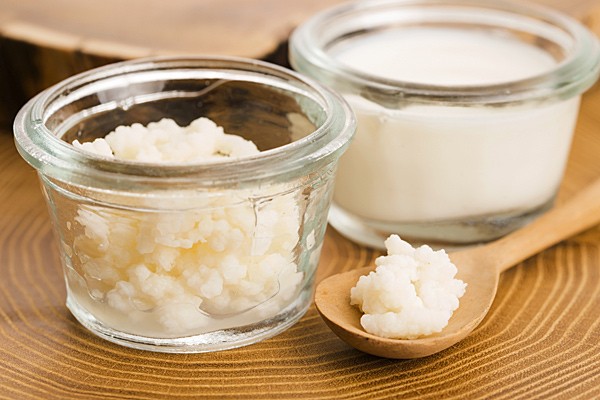In the past few years, the Western World has become obsessed with kefir. In alternative medicine, kefir is a known commodity for years. But in the Western world and its natural health community, kefir has slowly but steady risen to a superstar status in the past several years.
Why is kefir so good? Well, for starters, kefir is a natural food that is extremely high in probiotics and healthy nutrients. In some cultures, kefir is considered a healthier alternative to yogurt. And the best part is, you can easily prepare at home. With that in mind, let’s look at the 9 reasons you should start consuming kefir right now.
A nutritional dense bomb
Kefir is made of cow’s or goat’s milk. A fermented drink, kefir is made by adding grains to milk. But these are not grains in the traditional and conventional sense. The difference is these grains are cultures of yeast and lactic acid bacteria.
Once the grains are added to the milk, it takes 24 hours so that they ferment the sugars, and microorganisms in the kefir grains multiply. Thanks to the fermentation process, kefir is extremely rich in healthy nutrients. It is no surprise many consider a nutritional dense bomb.
Here is a quick breakdown of what you get in 175ml serving of kefir:
- 6g of protein
- 20% of the daily recommended dose of calcium
- 20% of the daily recommended dose of phosphorus
- 19% of the daily dose of B2
- 14% of the daily dose of B12
- 5% of the daily dose of magnesium
And all that in just 100 calories with 7g of carbs and 3-6g of fat. In short, the fermented drink is rich in healthy nutrients, and short in calories.
Kefir is great for lactose-intolerant individuals
While it is made out of milk, kefir is actually well tolerated by lactose intolerant individuals. It all comes down to the fermentation process, which makes it easy for us to digest lactose properly. Kefir turns lactose into lactic acid, making it more-suitable for our digestive system. You can even make kefir 100% lactose free if you use coconut water, non-dairy fluid, or fruit juice.
That makes kefir the best buttermilk substitute. And you can easily substitute 1 cup of kefir 1 cup of buttermilk.
Kefir has more probiotics than yogurt
We mentioned previously that some cultures find kefir more potent and powerful probiotic than yogurt. There is some science based facts to backup that theory.
Probiotics are healthy, good bacteria that improve our digestion, mental health, and control our weight management. Yogurt is widely considered the best known probiotic food in the Western World. However, kefir is more potent, with more than 30 strains of good bacteria and yeast.
Antibacterial properties
Thanks to the many good bacteria, kefir has antibacterial properties. Kefir is the only probiotic to contain “Lactobacillus kefiri”, a probiotic that can inhibit the growth of various harmful bacteria. Because of this, kefir protects you against Salmonella, Helicobacter Pylori, and E.Coli.
Kefir improves the digestive system
One of the main reasons people consume probiotics is to improve their digestive system. Kefir is great at this, and it all comes down to the probiotics in kefir. Thanks to good bacteria, kefir helps you restore balance in the gut, and maintain that balance in the future. With that, kefir helps against diarrhea, and other digestive issues.
For example, kefir can also be used as a prevention and treatment of irritable bowel syndrome. Anytime you have troubles with digestion, a cup of kefir will help you.
Goodbye allergy
In addition to improving our digestion, kefir also improves symptoms of allergy and asthma. Most allergic reactions are caused by inflammatory response in the gut. When you suffer from an over-sensitive immune system, you are prone to allergies. But kefir can suppress these inflammatory responses that are related to allergies. And while the studies are conducted on animals, we can expect human studies to explore these effects as well.
Kefir improves bone health
We mentioned in the nutritional breakdown that kefir contains magnesium. This is one of the two crucial minerals for bone health. The other is calcium, and kefir contains little bit of that as well. But more importantly, kefir contains vitamin K2, a crucial vitamin for calcium metabolism.
Some studies show that supplements of K2 can reduce the risk of bone fractures by more than 80%. And with kefir, you get the vitamin naturally. Because it contains both calcium and magnesium, kefir improves your calcium absorption by bone cells, improving your bone density and structure.
Kefir protects against cancer
It might be too optimistic, but the fact of the matter is that kefir can help with cancer prevention. We all know cancer to be one of the leading causes of death. And by now, there is not a medical cure for it.
And while kefir will not cure cancer, it can help prevent it. Because of the good bacteria it contains, kefir can inhibit tumor growth by reducing formation of cancer cells. The protective role of kefir against cancer has been proven in some studies.
And the studies show that kefir is more potent against cancer than yogurt.
You can easily make at home
The best part about kefir is you can make it at home. This might not be a health benefit, but it is nice to know you can get an all-in-one home remedy in your kitchen. You can buy kefir from the store, or you can easily grow it at home. The process is explained in depth by several YouTube tutorials. Combine your kefir with some fresh fruit, and you’ll get a healthy and tasty dessert.
References:
https://www.culturesforhealth.com/learn/milk-kefir/how-to-make-milk-kefir/
https://www.authoritydiet.com/what-kefir-health-benefits-better-yogurt/
https://www.ncbi.nlm.nih.gov/pmc/articles/PMC4566462/
https://www.ncbi.nlm.nih.gov/pubmed/25811034
http://nutritiondata.self.com/facts/custom/2881216/2
https://www.webmd.com/allergies/news/20030530/kefir-helps-lactose-intolerance






